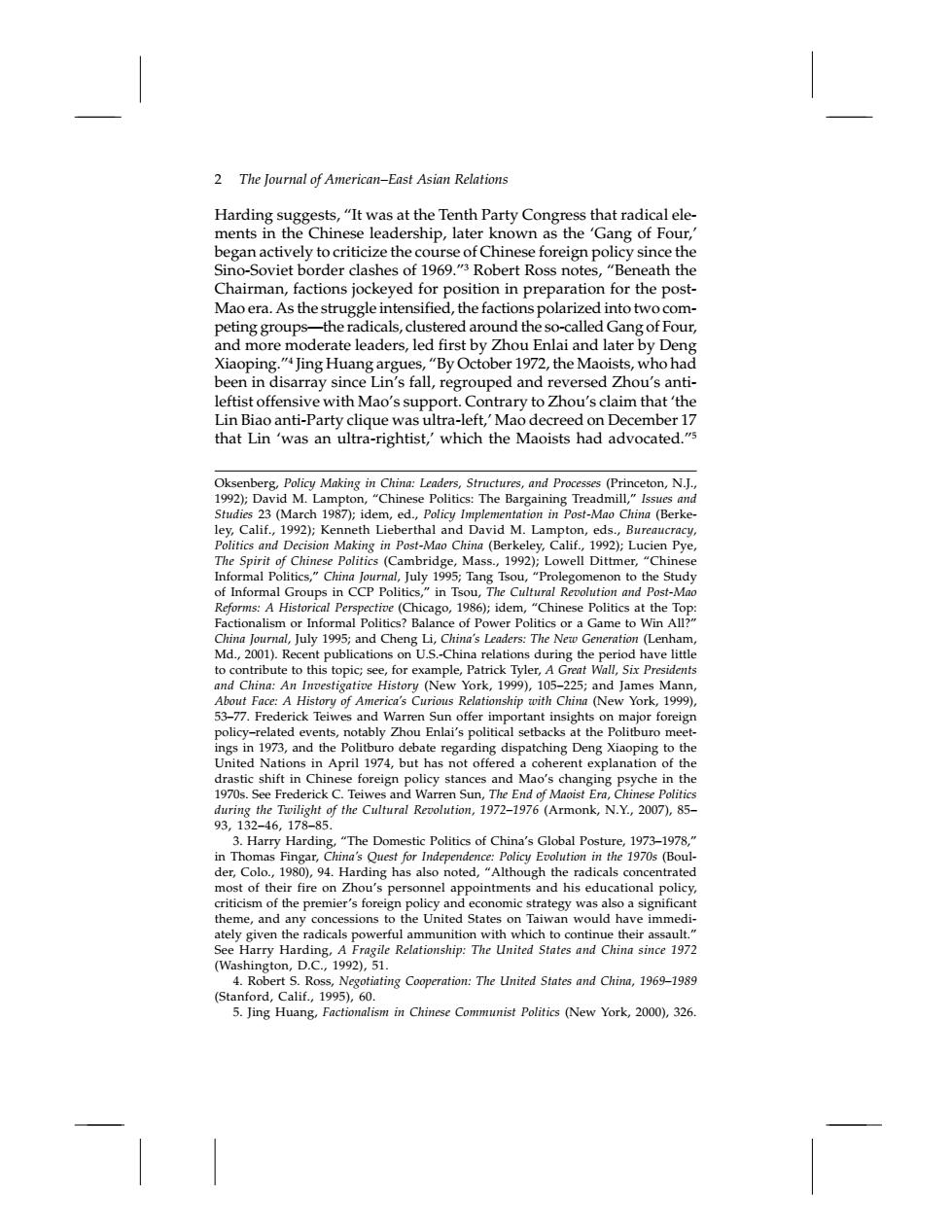正在加载图片...

2 The Journal of American-East Asian Relations Harding suggests,"It was at the Tenth Party Congress that radical ele- ments in the Chinese leadership,later known as the 'Gang of Four, began actively to criticize the course of Chinese foreign policy since the Sino-Soviet border clashes of 1969."3 Robert Ross notes,"Beneath the Chairman,factions jockeyed for position in preparation for the post- Mao era.As the struggle intensified,the factions polarized into two com- peting groups-the radicals,clustered around the so-called Gang of Four, and more moderate leaders,led first by Zhou Enlai and later by Deng Xiaoping."4 Jing Huang argues,"By October 1972,the Maoists,who had been in disarray since Lin's fall,regrouped and reversed Zhou's anti- leftist offensive with Mao's support.Contrary to Zhou's claim that 'the Lin Biao anti-Party clique was ultra-left,'Mao decreed on December 17 that Lin 'was an ultra-rightist,'which the Maoists had advocated."5 Oksenberg,Policy Making in China:Leaders,Structures,and Processes (Princeton,N.J. 1992);David M.Lampton,"Chinese Politics:The Bargaining Treadmill,"Issues and Studies 23 (March 1987);idem,ed.,Policy Implementation in Post-Mao China (Berke- ley,Calif.,1992);Kenneth Lieberthal and David M.Lampton,eds.,Bureaucracy, Politics and Decision Making in Post-Mao China (Berkeley,Calif.,1992);Lucien Pye, The Spirit of Chinese Politics (Cambridge,Mass.,1992);Lowell Dittmer,"Chinese Informal Politics,"China Journal,July 1995;Tang Tsou,"Prolegomenon to the Study of Informal Groups in CCP Politics,"in Tsou,The Cultural Revolution and Post-Mao Reforms:A Historical Perspective(Chicago,1986);idem,"Chinese Politics at the Top: Factionalism or Informal Politics?Balance of Power Politics or a Game to Win All?" China Journal,July 1995;and Cheng Li,China's Leaders:The New Generation (Lenham, Md.,2001).Recent publications on U.S.-China relations during the period have little to contribute to this topic;see,for example,Patrick Tyler,A Great Wall,Six Presidents and China:An Investigative History (New York,1999),105-225;and James Mann, About Face:A History of America's Curious Relationship with China (New York,1999), 53-77.Frederick Teiwes and Warren Sun offer important insights on major foreign policy-related events,notably Zhou Enlai's political setbacks at the Politburo meet- ings in 1973,and the Politburo debate regarding dispatching Deng Xiaoping to the United Nations in April 1974,but has not offered a coherent explanation of the drastic shift in Chinese foreign policy stances and Mao's changing psyche in the 1970s.See Frederick C.Teiwes and Warren Sun,The End of Maoist Era,Chinese Politics during the Twilight of the Cultural Revolution,1972-1976(Armonk,N.Y.,2007),85- 93,132-46,178-85. 3.Harry Harding,"The Domestic Politics of China's Global Posture,1973-1978," in Thomas Fingar,China's Quest for Independence:Policy Evolution in the 1970s (Boul- der,Colo.,1980),94.Harding has also noted,"Although the radicals concentrated most of their fire on Zhou's personnel appointments and his educational policy, criticism of the premier's foreign policy and economic strategy was also a significant theme,and any concessions to the United States on Taiwan would have immedi- ately given the radicals powerful ammunition with which to continue their assault." See Harry Harding,A Fragile Relationship:The United States and China since 1972 (Washington,D.C.,1992),51. 4.Robert S.Ross,Negotiating Cooperation:The United States and China,1969-1989 (Stanford,Calif.,1995),60. 5.Jing Huang,Factionalism in Chinese Communist Politics (New York,2000),326.2 The Journal of American–East Asian Relations Harding suggests, “It was at the Tenth Party Congress that radical elements in the Chinese leadership, later known as the ‘Gang of Four,’ began actively to criticize the course of Chinese foreign policy since the Sino-Soviet border clashes of 1969.”3 Robert Ross notes, “Beneath the Chairman, factions jockeyed for position in preparation for the postMao era. As the struggle intensified, the factions polarized into two competing groups—the radicals, clustered around the so-called Gang of Four, and more moderate leaders, led first by Zhou Enlai and later by Deng Xiaoping.”4 Jing Huang argues, “By October 1972, the Maoists, who had been in disarray since Lin’s fall, regrouped and reversed Zhou’s antileftist offensive with Mao’s support. Contrary to Zhou’s claim that ‘the Lin Biao anti-Party clique was ultra-left,’ Mao decreed on December 17 that Lin ‘was an ultra-rightist,’ which the Maoists had advocated.”5 Oksenberg, Policy Making in China: Leaders, Structures, and Processes (Princeton, N.J., 1992); David M. Lampton, “Chinese Politics: The Bargaining Treadmill,” Issues and Studies 23 (March 1987); idem, ed., Policy Implementation in Post-Mao China (Berkeley, Calif., 1992); Kenneth Lieberthal and David M. Lampton, eds., Bureaucracy, Politics and Decision Making in Post-Mao China (Berkeley, Calif., 1992); Lucien Pye, The Spirit of Chinese Politics (Cambridge, Mass., 1992); Lowell Dittmer, “Chinese Informal Politics,” China Journal, July 1995; Tang Tsou, “Prolegomenon to the Study of Informal Groups in CCP Politics,” in Tsou, The Cultural Revolution and Post-Mao Reforms: A Historical Perspective (Chicago, 1986); idem, “Chinese Politics at the Top: Factionalism or Informal Politics? Balance of Power Politics or a Game to Win All?” China Journal, July 1995; and Cheng Li, China’s Leaders: The New Generation (Lenham, Md., 2001). Recent publications on U.S.-China relations during the period have little to contribute to this topic; see, for example, Patrick Tyler, A Great Wall, Six Presidents and China: An Investigative History (New York, 1999), 105–225; and James Mann, About Face: A History of America’s Curious Relationship with China (New York, 1999), 53–77. Frederick Teiwes and Warren Sun offer important insights on major foreign policy–related events, notably Zhou Enlai’s political setbacks at the Politburo meetings in 1973, and the Politburo debate regarding dispatching Deng Xiaoping to the United Nations in April 1974, but has not offered a coherent explanation of the drastic shift in Chinese foreign policy stances and Mao’s changing psyche in the 1970s. See Frederick C. Teiwes and Warren Sun, The End of Maoist Era, Chinese Politics during the Twilight of the Cultural Revolution, 1972–1976 (Armonk, N.Y., 2007), 85– 93, 132–46, 178–85. 3. Harry Harding, “The Domestic Politics of China’s Global Posture, 1973–1978,” in Thomas Fingar, China’s Quest for Independence: Policy Evolution in the 1970s (Boulder, Colo., 1980), 94. Harding has also noted, “Although the radicals concentrated most of their fire on Zhou’s personnel appointments and his educational policy, criticism of the premier’s foreign policy and economic strategy was also a significant theme, and any concessions to the United States on Taiwan would have immediately given the radicals powerful ammunition with which to continue their assault.” See Harry Harding, A Fragile Relationship: The United States and China since 1972 (Washington, D.C., 1992), 51. 4. Robert S. Ross, Negotiating Cooperation: The United States and China, 1969–1989 (Stanford, Calif., 1995), 60. 5. Jing Huang, Factionalism in Chinese Communist Politics (New York, 2000), 326